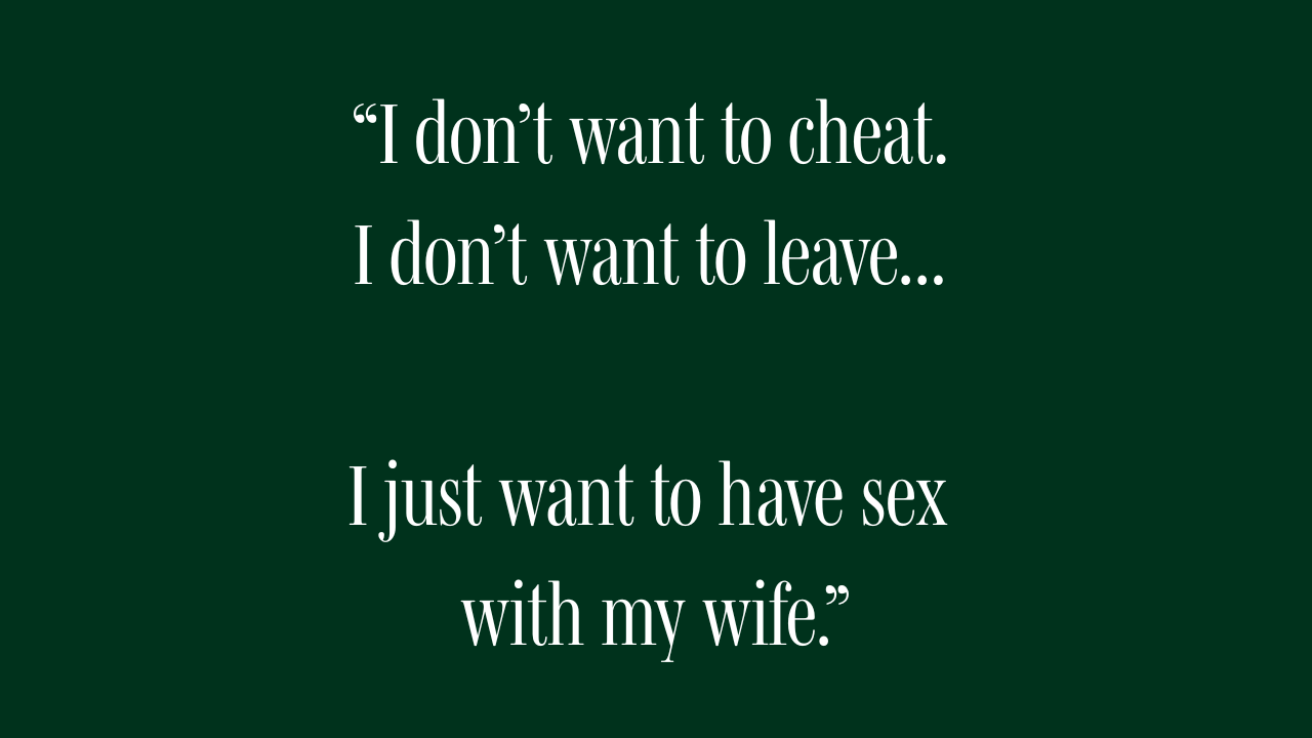10 Ways to Confront a Sexless Marriage
When he first called, it was about coaching.
He wanted to optimize. Dial it all in—fitness, focus, discipline, the next phase of life. Standard stuff for men in their 50s.
But ten minutes in, we were talking about sex. Or the lack of it.
“Greg,” he said, “we have sex about once a week. Which, I realize at 55, isn’t the worst thing in the world. But it’s not enough for me.”
He’s in the best shape of his life. He’s on TRT. He’s doing the work. And he’s still frustrated—not with performance, but with disconnection.
“It’s always the same,” he continued. “She lays down. I get on top. I do my thing. Maybe she finishes, maybe she doesn’t. No oral. No foreplay. No touching. Just… get it over with. It feels like she’s giving in, not giving herself. Like I’m a chore.”
Then he told me about the letter.
Twenty-five years ago, when they were dating long distance, he flew in to see her. She left the apartment to pick up food. He snooped—he’s not proud of it—and found a letter from her ex-fiancé. The letter read like a business agreement: “Maybe one week you do something for me, and I do something for you.”
It was about sex. Transactional. Lifeless.
At the time, he told himself that’s why she ended it—because she didn’t want a passionless marriage. But now, 25 years later, the same thing is playing out. And he can’t shake it.
“We’ve got a great life, Greg. Beautiful family. She looks great. She’s a great mom. But this… this is killing me. And I don’t know what to do. I don’t want to leave. I don’t want to cheat. But I also don’t want to feel like I’m invisible. Like I’m unwanted. Like I don’t matter.”
And here’s the part most guys never say out loud, but almost every guy in this spot has thought:
“I don’t want to sleep with someone else. I just want to feel like my wife wants to sleep with me.”
This Is Our Love Language
If you’ve read my book, The Midlife Male, you might remember the chapter: “Fuck Us and Feed Us.”
Crass? Maybe. Honest? Definitely.
Because for a lot of men—maybe most—it’s that simple.
This is how we feel loved.
This is how we reconnect.
This is our love language.
It’s not something to be mocked, minimized, or dismissed.
It’s not “just sex.”
It’s how we feel wanted. Desired. Respected. Seen. Manly.
And when it’s gone—or when it becomes robotic, transactional, or nonexistent—it doesn’t just impact the bedroom. It chips away at our confidence, our connection, and our sense of worth.
That doesn’t make us fragile.
That makes us human.
What No One Tells Us
We talk about menopause. We should. It’s real. It’s respected. It has books, podcasts, communities, cultural space.
But what about andropause?
What about the man who’s doing all the right things—getting in shape, showing up for his wife, staying engaged—and still feels emotionally and sexually irrelevant?
What’s the strategy for him?
Because while he’s being told to stop drinking, stop watching porn, stop complaining, be more vulnerable, meditate, stay in his masculine lane, be soft, be hard, be available, be stoic—what is he actually supposed to do when intimacy disappears and no one wants to talk about it?
There’s a theory I’ve come to believe:
A lot of what we call erectile dysfunction is actually erectile disinterest.
Not physical. Psychological. Emotional.
Men who are simply no longer excited about the person or the pattern they’re stuck in.
Not because they’re shallow.
Because they’re starved.
What Are the Options?
There’s no one-size-fits-all solution. But there are real, actionable choices. Some hard. Some hopeful. Here’s what’s actually on the table for the guy in this situation:
1. Couples Therapy
Talk. With help. Sex therapy, intimacy coaching, relationship counseling. If you haven’t tried it with someone good, you haven’t truly tried.
2. Individual Therapy
You may be carrying resentment, fear, shame, confusion. Work it out. Get your own house in order first.
3. Hormonal & Medical Evaluation (For Both of You)
It’s not all psychological. Men and women in midlife are in chemical transition. TRT helps men. HRT can help women. Know what’s going on beneath the surface.
4. Honest Conversation
No therapists, no scripts. Just, “I want more. I miss us. Can we talk about this?” It’s hard. But it’s necessary.
5. Reignite Curiosity and Play
New experiences. Toys. Stories. Hotels. Different times of day. It’s not about kink—it’s about breaking routine and reigniting spark.
6. Open Marriage
It’s not for everyone. But it is on the table for some. If you go down this path, make sure you’re both aligned, honest, and prepared for the complexity.
7. Cheating
Let’s not pretend it doesn’t happen. Often not from malice, but loneliness. Still, it usually makes everything worse. You don’t fix disconnection with deception.
8. Porn
Controversial, yes. But some men use it as a healthy outlet. Others use it to avoid the hard work. Ask yourself: is it a supplement or a substitute?
9. Divorce
If the relationship is no longer reciprocal, safe, or loving—and you’ve tried everything else—leaving may be the healthiest path forward. It’s painful. It’s also sometimes honest.
10. Radical Acceptance
Some men stay. They shift their expectations. They invest in other parts of life: fatherhood, friendship, purpose, peace. But let that be a choice—not a resignation.
Say the Hard Thing
Tell the truth. To yourself. To your partner. To someone. Because silence? Silence is what’s killing men in midlife.
This isn’t just about sex.
It’s about intimacy. Appreciation. Feeling seen.
It’s about still wanting to feel wanted.
If you’re in this place—if this article hit you in the chest—let me say this:
You are not broken.
You are not crazy.
You are not alone.
You are a middle-aged man who still wants to feel alive.
And there’s nothing wrong with that.
It doesn’t make you weak.
It makes you real.
And it’s time we start saying it out loud.
In Health,
Greg

midlifemale
midlifemale
Greg Scheinman
Founder, Midlife Male
52. Husband. Father. Entrepreneur. Coach
Follow me on LinkedIn, and Instagram








